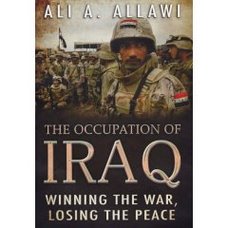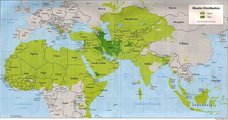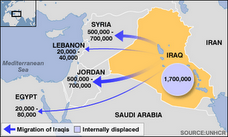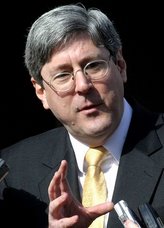.... if it was foolish to accept the best-case assumptions that led us to invade Iraq, it's also foolish not to question the worst-case assumptions that undergird arguments for staying. Is it possible that a quick withdrawal of U.S. forces will lead to a dramatic worsening of the situation? Of course it is, just as it's possible that maintaining or escalating troops there could fuel the unrest. But it's also worth considering the possibility that the worst may not happen: What if the doomsayers are wrong?....
Will the center hold?
Not only is the worst-case scenario far from a sure thing in the event of an American withdrawal, but there is also a best-case scenario. Precisely because the idea of all-out civil war and a regional blowup involving Iran, Saudi Arabia, and Turkey is so horrifying, all the political forces inside and outside Iraq have many incentives not to go there....
Contrary to the conventional wisdom in Washington, Iraq is not a make-believe state cobbled together after World War I, but a nation united by the Tigris and Euphrates rivers, just as the Nile unites Egypt. Historically, the vast majority of Iraqis have not primarily identified themselves according to their sect, as Sunnis or Shiites. Of course, as the civil war escalates, more Iraqis are identifying by sect, and tensions are worsening. But it is not too late to resurrect some of the comity that once existed. The current war is not a conflict between all Sunnis and all Shiites, but a violent clash of extremist paramilitary armies. Most Iraqis do not support the extremists on either side. According to a poll conducted in June 2006 by the International Republican Institute, "seventy-eight per cent of Iraqis, including a majority of Shiites, opposed the division of Iraq along ethnic and sectarian lines."
In addition, the country's vast oil reserves, conceivably the world's largest, could help hold Iraq together. Iraqi politicians are currently devising a law that would ratify the central government's control of all of the country's oil wealth. Even the corruption that now cripples Iraq tethers Iraqi political leaders to the central government and to the idea of Iraq as a nation-state. "None of the big players really want civil war," says an Iraqi military official closely affiliated with Ahmad Chalabi's Iraqi National Congress. "None of them want to give up the regular flow of funds that they get now from corruption."
What most Iraqis do seem to want, according to numerous polls, is for American forces to leave. Even within the current, skewed Iraqi political system, a majority of Iraq's parliament supports a U.S. withdrawal. If we add to the mix the powerful Sunni-led resistance, including former Baathists, Sunni nationalists, and tribes, an overwhelming majority wants to end the occupation.
It is clear that there are many features of Iraq's current landscape that lend themselves to the eventual creation of a stable, postwar nation -- although rebuilding the country will take generations. It is, at this point, the best we can hope for. Like all best-case scenarios, it might or might not happen. But the very same can be said of the worst-case scenario -- a scenario that war hawks portray as a certainty and wave, like a bloody shirt, to scare decision-makers and members of Congress into supporting a failed strategy.
Monday, February 19, 2007
Subscribe to:
Post Comments (Atom)





No comments:
Post a Comment